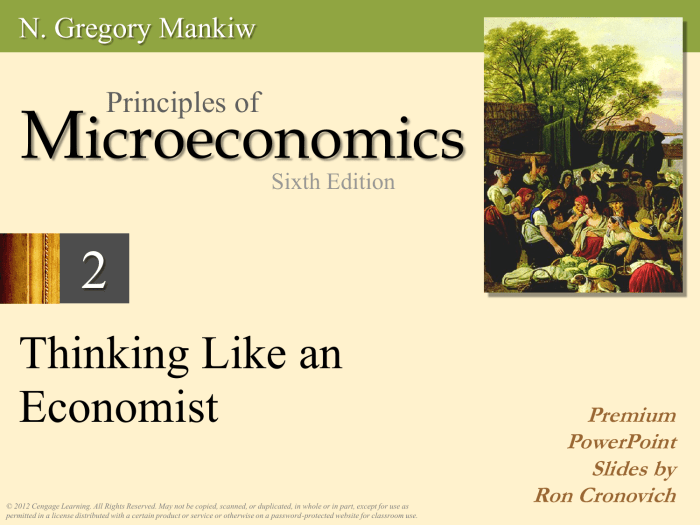Principles of microeconomics n. gregory mankiw – Dive into the principles of microeconomics with N. Gregory Mankiw, a renowned expert in the field. This comprehensive guide offers a captivating exploration of the fundamental concepts, theories, and applications of microeconomics, providing a deep understanding of how individuals and firms make decisions in a market economy.
From the basics of supply and demand to the complexities of market structures and government intervention, this guide delves into the intricate workings of microeconomic principles, offering insights into consumer behavior, producer behavior, and the role of government in shaping market outcomes.
1. Introduction: Principles Of Microeconomics N. Gregory Mankiw

Microeconomics is a branch of economics that focuses on the behavior of individual entities within an economy, such as consumers, producers, and firms. It analyzes how these entities make decisions and interact with each other in the marketplace.
Microeconomics is significant because it provides insights into the functioning of markets, the allocation of resources, and the determination of prices. By understanding microeconomic principles, policymakers can design policies that promote economic efficiency and well-being.
2. Basic Concepts

Scarcity and Its Implications
Scarcity refers to the limited availability of resources relative to human wants. This fundamental concept implies that individuals and societies must make choices about how to allocate these scarce resources to satisfy their needs.
Principles of Demand and Supply
Demand refers to the quantity of a good or service that consumers are willing and able to purchase at a given price. Supply refers to the quantity of a good or service that producers are willing and able to offer for sale at a given price.
The interaction of demand and supply determines the equilibrium price and quantity in a market. At equilibrium, the quantity demanded equals the quantity supplied, and there is no pressure for the price to change.
Role of Market Equilibrium
Market equilibrium is a state of balance in which the forces of demand and supply are in equilibrium. This state is characterized by a stable price and quantity that satisfy both consumers and producers.
Market equilibrium plays a crucial role in ensuring the efficient allocation of resources in an economy. It helps to ensure that the right amount of goods and services are produced at the right prices.
3. Consumer Behavior

Concept of Utility and Consumer Preferences
Utility is a measure of the satisfaction or benefit that consumers derive from consuming a good or service. Consumer preferences refer to the way consumers rank different goods and services based on their utility.
Consumer preferences are subjective and vary across individuals. Understanding consumer preferences is essential for producers to develop products and services that meet the needs of consumers.
Theory of Rational Choice, Principles of microeconomics n. gregory mankiw
The theory of rational choice assumes that consumers make decisions that maximize their utility. This means that consumers will choose the goods and services that provide them with the most satisfaction, given their budget constraints.
Rational choice theory helps to explain consumer behavior and predict how consumers will respond to changes in prices, income, and other factors.
Impact of Income and Prices on Consumer Demand
Income and prices have a significant impact on consumer demand. As income increases, consumers tend to demand more goods and services. Conversely, as prices increase, consumers tend to demand less of a good or service.
These relationships are represented by the income and price elasticity of demand, which measure the responsiveness of demand to changes in income and prices, respectively.
User Queries
What is the scope of microeconomics?
Microeconomics focuses on the behavior of individual entities within an economy, such as consumers, firms, and households, and their interactions in specific markets.
How does scarcity affect economic decisions?
Scarcity forces individuals and firms to make choices about how to allocate their limited resources, leading to trade-offs and opportunity costs.
What is the significance of market equilibrium?
Market equilibrium occurs when the quantity of a good or service supplied equals the quantity demanded, resulting in a stable price and allocation of resources.
How does government intervention impact microeconomic outcomes?
Government intervention can influence market outcomes by regulating prices, providing subsidies, or imposing taxes, aiming to address market failures or achieve specific economic objectives.